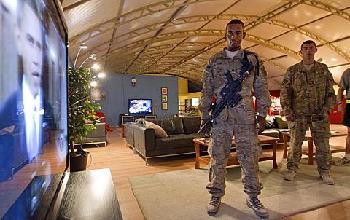US President Barack Obama Wednesday announced a drawdown of US forces from Afghanistan next month, with a grim warning to Pakistan: terrorist safe havens will not be tolerated.

In a nationally televised speech Wednesday, President Obama said the US will withdraw 10,000 troops from Afghanistan by the end of this year and another 23,000 over the next 14 months with security to be handed over entirely to Afghan forces by 2014.
He also gave credit to Pakistan's government, saying it has worked with the United States to eliminate over half the leadership of al-Qaida.
But Obama also said that the US must address the problem of terrorist safe-havens in Pakistan, and to work with its government to root out what he called "the cancer of violent extremism." The US, he said, will insist that Pakistan's government "keep its commitments."
Pakistani analyst Professor Hassan Askari of Punjab University says that President Obama's message of both praise and warning did not go unnoticed.
"There is a recognition that with the cooperation of Pakistan, al-Qaida has been weakened in the past," said Askari. "So there is an appreciation. But along with the appreciation there is a word of caution for Pakistan that there are safe havens in Pakistan and the US would press Pakistan for action and they would be working with Pakistan to make sure that these safe havens are no longer there."
What many Pakistanis were most encouraged by is President Obama's plan for a political solution that includes negotiations with the Afghan Taliban.
In a joint press conference with visiting British Foreign Minister William Hague in Islamabad, Pakistan's acting Foreign Minister Hanna Rabbani Khar said that what happens in Afghanistan will have a significant impact on Pakistan.
"Afghanistan is a country which is a sovereign country and an independent country," said Khar. "And as neighbors, as important neighbors, as a neighbor who is going to be affected by both peace and stability and lack thereof in Afghanistan, Pakistan will stand by on any of these issues by whatever is an Afghan-owned solution, and whatever is an Afghan-led solution."
The Taliban have been pushed out of some areas of Afghanistan's southern heartland. But the insurgency has intensified along Afghanistan's eastern border with Pakistan, which was one of only three countries that recognized the Taliban-led government that ruled Afghanistan from 1996 to 2001.
The withdrawal of the US-led NATO force from Afghanistan has regional implications, with some in the neighborhood, above all India, fearing that the influence of its neighbor and rival Pakistan could grow if the Taliban is able to regain power in Afghanistan. Pakistan, for its part, is unhappy over the degree to which India has gained influence in Afghanistan since the Taliban's ouster in 2001.
The leaders of India and Afghanistan have sought to play down these fears. Indian Prime Minister Manmohan Singh said during a visit to Afghanistan in May that his country supports the Afghan government's efforts to negotiate with the Taliban to bring an end to the almost 10-year-old war.
Earlier this month, Afghan President Hamid Karzai visited Pakistan and announced new measures aimed at improving security and ending the war in his country, including the creation of a joint Afghan-Pakistani Commission for Reconciliation and Peace in Afghanistan to negotiate with elements of the Afghan Taliban.
Pakistan's leadership, for its part, has indicated that ending the war next door will go a long way towards reducing instability in the region and perhaps help repair the damaged relationship between Islamabad and Washington.
Polls show Americans weary of Afghan conflict
Gates to NATO allies: do not rush out of Afghanistan
Despite stern warning, Karzai knows US is an ally: Gates
Afghanistan eyes reconstruction
(來(lái)源:VOA 編輯:崔旭燕)
